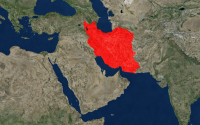Common Dreams / Published on Sunday, July 1, 2007 by Agence France PresseAnita Purcell-Sjoelund
Food production in developing countries will halve in the next 20 years unless wealthy nations lower their rate of consumption, the Stockholm Environment Institute warned at a weekend conference.
The livelihoods of more than three billion people in the world are being undermined by the wealth of the privileged few, the institute’s executive director, Johan Rockstroem, warned.
“The risk is that we might halve … food production in sub-Saharan Africa because of our lifestyles,” he told AFP on the sidelines of an international conference on climate change and sustainable development, held in the Swedish town of Taellberg.
Rockstroem said that as wealthy countries increase consumption they also increase their exploitation of the world’s natural resources, and in turn emit more greenhouse gases.
That ultimately speeds up the desertification of sub-Saharan Africa and other parts of the world.
According to scientists and experts, greenhouse gas emissions are continuing to rise by two percent a year despite hundreds of environmental agreements, including the Kyoto Protocol.
James Hansen, a climate expert and the director of the NASA Goddard Institute for Space Studies, said tree lines moving north and melting glaciers were not only a consequence of global warming, they were also an accelerating factor.
“Forests are moving forward and that … amplifies climate change. Ice sheets are beginning to melt earlier in the season. They become darker when they become wet and they absorb more sunlight” which warms the planet’s temperature, he said.
As a result, experts have predicted that the world has at least a decade to lower emissions before it is too late.
The Stockholm Environment Institute is one of the world’s top five research organisations in climate change and it is pushing for a broader dialogue on social and economic change.
“We have come to the end of the road of sustainable development as we know it today. Science alone cannot deal with this. The risk of environmental refugees, the risk of societal collapse is imminent,” Rockstroem said.
“We need to make massive changes in the equity and stewardship of the planet which goes way beyond climate change,” he added.
Bo Ekman, founder and chairman of the Taellberg Forum, agreed.
“We cannot continue with business as usual, rather we must change our ways to business as sustainable,” he said.
Hansen suggested the possibility of introducing punitive measures to help protect the environment.
“Oil and gas, which are being exploited now and will (continue to) be, are going to take us close to the dangerous level and there are huge reservoirs of coal and unconventional fossil fuels. Countries across the world are continuing to build or plan to build coal-fired power plants and we simply can’t do that, he said.
“We’re going to have to put a price on carbon emissions,” he said.
The Taellberg Forum each year gathers more than 500 political leaders, scientists and aid workers in the resort village of Taellberg to discuss world issues in a relaxed atmosphere, with nature walks and music concerts on the agenda.






